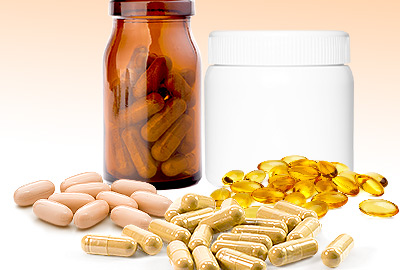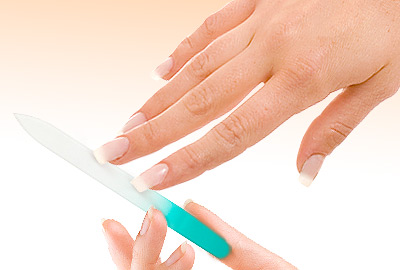No matter how meticulously a woman cares for her nails, they often become brittle, start peeling, and look cracked during the menopausal transition. Fortunately, with the right methods, she can resolve hormonal imbalance, treat brittle nails, and restore the shine her nails once had.
Continue reading to discover the best treatments for brittle nails and enjoy hormonal equilibrium far into your midlife years.
Three Approaches to Treating Brittle Nails
There are three approaches to treating brittle nails: (1) Lifestyle changes, (2) Alternative medicine, and (3) Medications, which range from low-risk options to more invasive treatments. It is recommended to start with the most natural approaches and move on to more risky ones only if necessary.
Lifestyle Changes for Brittle Nails Treatment

First-level treatment for brittle nails involves the least amount of risk, though it does require the highest amount of self-discipline. Nevertheless, making simple adjustments in one's lifestyle can help a woman get rid of symptoms naturally.
Nutritious Diet
The body uses nutrients in food to repair itself and build new tissue, including nails and hair. As such, when treating brittle nails, it is important to build one's menopause diet around ample amounts of lean protein, healthy fats, and complex carbohydrates that are rich in the following nutrients:
- Phytoestrogens, or plant estrogens,regulate hormone levels to treat brittle nails and other menopause symptoms.
Soy, oats, apple, flax, alfalfa
- Biotin, known as vitamin H or B7, has been shown effective in treating brittle nails and improving their appearance.1
Avocado, salmon dairy, eggs, sweet potato
- Vitamin C helps build collagen, a type of protein known for nourishing the nails and promoting their growth. 2
Camu camu, oranges, lemons, bell peppers
- Omega-3 fatty acid deficiency may cause nails to become brittle and dry, losing natural shine and cracking.3
Chia, flaxseed, fish, nuts, sacha inchi
Regular Exercise
While workouts will not treat brittle nails on their own, they can help the body resolve hormonal imbalance, the root cause of menopause symptoms. When done regularly, exercise can also aid in managing weight gain, relieving fatigue, and improving circulation throughout the body, including for the nails.
Amount: An ideal exercise routine consists of at least 150 minutes of low- to moderate-level physical activity per week, evenly broken up into shorter, 30-minute trainings.4
Type: The best workouts to restore hormonal balance and treat brittle nails combine aerobic and muscle-strengthening exercises, such as dancing or swimming with yoga or resistance bands.
Useful tips: To prevent further weakening the nails, it is recommended to avoid the types of sports that may cause direct trauma to them, like volleyball.
Precautions: Since middle-aged women are at a higher risk of osteoporosis and related fractures, it is important to focus on low- to moderate-level workouts.5
Wholesome Habits
Women can complement their diets and exercise regimens with various wholesome habits, which - when practiced consistently - can help balance hormones and treat brittle nails during menopause and beyond. Consider the following:
Relieving stress is beneficial since prolonged stress is one of the most common causes of hormonal disruption.6 To find the best methods, women can try mindfulness meditation, conscious breathing, or biofeedback.
Being mindful of harmful habits that damage and weaken nails can be a valuable addition to brittle nails treatment. It includes using harsh nail products, cleaning without gloves, using nails as a tool, or biting them.
Trying herbal remedies, like oatmeal, coconut oil, or olive oil nail soaks, may help strengthen nails naturally and nourish them with nutrients they need to grow.
Quitting addictions to alcohol and nicotine is a must in brittle nails treatment as both can contribute to hormonal imbalance and worsening of physical and emotional symptoms of menopause.7,8
Alternative Medicine for Brittle Nails Treatment

The second level of brittle nails treatments consists of various alternative medicine approaches, including herbal supplements. They are an affordable, low-risk way to balance hormones and alleviate menopause symptoms.
There are two types of herbal supplements that may be used in the treatment of brittle nails: phytoestrogenic and hormone-regulating supplements.
Phytoestrogenic Supplements
Phytoestrogenic herbs, such as ginseng, contain plant-based compounds that resemble estrogen. When they enter the body, these estrogenic compounds help balance hormone levels and lessen the symptoms of an imbalance, such as brittle nails. However, adding outside hormones to the body can reduce its capability to produce its own hormones, which may cause further decline. As such, phytoestrogenic supplements are best used short-term.
Hormone-Regulating Supplements
Hormone-regulating supplements, like Macafem, do not contain plant estrogens or any external hormones. Rather, they nourish the endocrine glands to promote natural hormone production. The resulting balance helps treat brittle nails and other menopause symptoms. These supplements are considered safe and effective since they virtually cause no side effects, can be used long-term, and stimulate hormone production from within.
From Nature and Health Magazine, Dr. Chacon says:
"Macafem's nutrients help restore natural hormones in women. Unlike hormone drugs, which are basically resumed in taking synthetic hormones, Macafem acts totally different in your body. It nourishes and stimulates your own natural hormone production by inducing the optimal functioning of the pituitary and endocrine glands." Click on the following link to learn more about Macafem.
A combination of lifestyle changes and herbal supplements is usually the most effective and sufficient treatment for brittle nails. However, severe symptoms may require more conventional treatment methods.
Conventional Medicine for Brittle Nails Treatment

Third-level approaches to treating brittle nails often carry the highest cost, and some may come with significant side effects. Nevertheless, conventional medicine can be an invaluable tool in relieving symptoms and strengthening the nails.
Hormone Replacement Therapy (HRT)
HRT was once a very popular treatment method for menopausal ailments, including treating brittle nails. While it can be a quick and powerful treatment, its use has been associated with serious side effects and major health risks, as seen in the following studies. Consequently, HRT is generally prescribed only for severe symptoms.
Other Medications
Depending on the cause of brittle and cracking nails, there might be other medications added to the treatment plan, aimed at resolving the underlying problem and restoring nail health. This may include treating infections, liver disease, or other thyroid disorders, among others.
The three aforementioned approaches to brittle nails treatment can be applied in any combination, depending on symptom severity and a woman's health status. Yet, more and more women manage to relieve symptoms by blending healthy lifestyle changes and hormone-regulating herbal supplements without relying on risky treatments.
A Safe Way of Treating Brittle Nails
Implementing Lifestyle Changes:
- Eating foods rich in phytoestrogens, biotin, vitamin C, and omegas
- Opting for low or moderate exercise for 150 minutes per week
- Relieving stress through yoga, meditation, and breathing exercises
- Avoiding unhealthy habits that may damage and weaken the nails
And Taking Herbal Supplements:
- Phytoestrogenic herbal supplements, like ginseng
- Or natural hormone-regulating supplements, like Macafem
Sources
- American Osteopathic College of Dermatology. (n.d.). Brittle Splitting nails. Retrieved June 24, 2020 from https://www.aocd.org/page/BrittleSplittingNail?
- Dermatology and Therapy. (2019). Pathogenesis, Clinical Signs and Treatment Recommendations in Brittle Nails: A Review. Retrieved June 24, 2020 from https://link.springer.com/article/10.1007/s13555-019-00338-x
- Mayo Clinic. (2018). Fingernails: Do's and don'ts for healthy nails. Retrieved June 24, 2020 from https://www.mayoclinic.org/healthy-lifestyle/adult-health/in-depth/nails/art-20044954
- Mayo Clinic. (2019). Is it possible to prevent split fingernails? Retrieved June 24, 2020 from https://www.mayoclinic.org/healthy-lifestyle/adult-health/expert-answers/split-fingernails/faq-20058182
Footnotes:
- Journal of Drugs in Dermatology. (2007). Vitamins and Minerals: Their Role in Nail Health and Disease. Retrieved June 24, 2020 from https://pubmed.ncbi.nlm.nih.gov/17763607/
- Nutrients. (2017). The Roles of Vitamin C in Skin Health. Retrieved June 24, 2020 from https://www.ncbi.nlm.nih.gov/pmc/articles/PMC5579659/
- Advances in Dermatology and Allergology. The influence of selected ingredients of dietary supplements on skin condition. Retrieved June 24, 2020 from https://www.ncbi.nlm.nih.gov/pmc/articles/PMC4112259/
- American Heart Association. (2018). Recommendations for Physical Activity in Adults and Kids. Retrieved June 10, 2020 from https://www.heart.org/en/healthy-living/fitness/fitness-basics/aha-recs-for-physical-activity-in-adults
- A Journal of Mid-Life Health. (2011). Exercise beyond menopause: Dos and Don'ts. Retrieved June 24, 2020 from https://www.ncbi.nlm.nih.gov/pmc/articles/PMC3296386/
- Indian Journal of Endocrinology and metabolism. (2011). Stress and hormones. Retrieved June 24, 2020 from https://www.ncbi.nlm.nih.gov/pmc/articles/PMC3079864/
- Women in Balance Institute. (n.d.). Cigarettes Can Sabotage Hormone Balance. Retrieved June 24, 2020 from https://womeninbalance.org/2012/10/26/cigarettes-can-sabotage-hormone-balance/
- Endocrinology and Metabolism Clinics. (2014). Effects of Alcohol on the Endocrine System. Retrieved June 24, 2020 from https://www.ncbi.nlm.nih.gov/pmc/articles/PMC3767933/
- JAMA. (2002). Risks and benefits of estrogen plus progestin in healthy postmenopausal women: principal results from the Women's Health Initiative randomized controlled trial. Retrieved June 10, 2020 from https://www.ncbi.nlm.nih.gov/pubmed/12117397
- The Lancet. (2019). Type and timing of menopausal hormone therapy and breast cancer risk: individual participant meta-analysis of the worldwide epidemiological evidence. Retrieved June 10, 2020 from https://www.thelancet.com/journals/lancet/article/PIIS0140-6736(19)31709-X/fulltext



